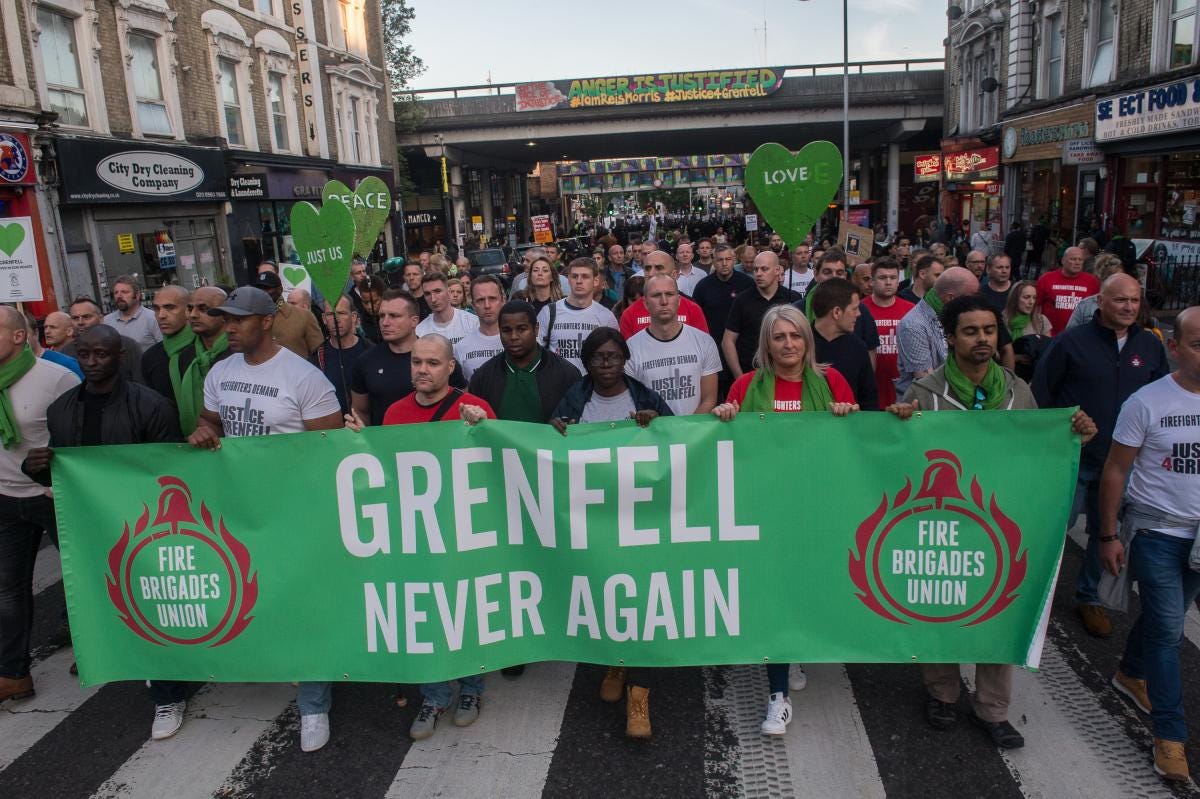16 June 2022. Tech | Grenfell
The smart home isn’t so smart// An everyday tale of greed, deceit, and carelessness
Welcome to Just Two Things, which I try to publish daily, five days a week. Some links may also appear on my blog from time to time. Links to the main articles are in cross-heads as well as the story. And a reminder that if you don’t see Just Two Things in your inbox, it might have been routed to your spam filter.
Apologies that I missed yesterday’s edition—pressing work deadlines were to blame.
1: The smart home isn’t so smart
There’s a short piece in Wired magazine by Simon Hill on the what living in a so-called ‘smart home’ means in practice. This has been talked about by futurists certainly since the 1990s, and I suspect that if I looked into it I’d find an edition of the Jetsons which used it as a plotline—or even the Flintstones.
But the verdict so far is: needs more work. In theory:
Gadgets free us from domestic drudgery, remind us of our work commitments and appointments, and protect us from intruders. The smart home is supposed to make life easier.
In practice:
“Dad! The light isn’t turning on!” “Simon! Google won’t open the curtains again!” “How do I get YouTube on your TV?” “Which app is it for the garden lights again?” Invite smart bulbs , robot vacuums, smart speakers, and other wondrous devices into your house, and you will soon see the cracks.
Switches apparently cause the most problems, because the smart lighting only works as long as you don’t touch the old switches. And that’s less easily said than done—even if the family is perfectly trained out of their old habits, unwitting visitors might flick a switch.
(James Vaughan, ‘Monsanto Home of Tomorrow’, Disneyland, 1957. Via flickr, CC BY-NC-SA 2.0)
And sometimes the smart device is a bit slow on the uptake, and it would have been easier to do the whole thing by hand.
On top of that, every device has its own app, which adds up to a lot of apps, and inter-operability between devices seems, by his account, under-developed:
You can always ask Google Assistant, Alexa, or Siri, though. Right? Well, actually, the security cameras work with Google, but you have to use Siri for the doorbell. Google Assistant plays music on the dining room speaker, but Alexa does music in your bedroom. Oh, and when you ask, you can’t say, “Turn on my bedroom light." You must say, “Turn on Amy’s bedroom light."
Help is apparently at hand, if the tech companies are to be believed, but it might be a bit of a slow train coming:
Matter, the new smart-home standard, is due any minute now and will tackle some of these problems.... But don’t get too excited. As Michele Turner, director of Google's Smart Home Ecosystem, told me recently, it will provide a robust and reliable foundation to build on, but the individual devices themselves still need a lot of work.
And even an early adopter cum enthusiast like Simon Hill conveys the sense that perhaps we’re trying to solve the wrong problem in designing smartness into our home. Maybe automatic lights or automatic curtain-closing aren’t worth the effort that’s going into them:
To be frank, I'm not that excited about automatically unlocked doors... the smart home promises smarter energy management and protecting my family from unusual activity. But the road is long, and we are still years away from a smart home worthy of the name. For now, I'd settle for not having to open the curtains for my wife or kids.
2: An everyday tale of greed, deceit, and carelessness
It is the fifth anniversary this week of the fire at Grenfell Tower in west London, which killed 72 people. It was marked with a service at Westminster Abbey and a silent walk around the tower. If you’re not aware of the detail, a faulty kitchen appliance in one of the flats led to the building cladding catching fire, and spreading quickly.
(Firefighters at this week’s Silent Walk to commemorate Grenfell. Image: Fire Brigades Union).
The inquiry so far has been a long litany of how the poor are held in contempt by politicians, officers, and the businesses they contract. The architect and writer Douglas Murphy summarised this well on Twitter:
So much of the Grenfell story is something any built environment professional will recognise... the deluge of confusing specification info, the greediness of contractors, the inadequacy of private building control, the fecklessness of local authorities, and the overwhelming pressure to bodge things cheaply.
The Inside Housing journalist Peter Apps has perhaps done more work on all of this than anyone else, and in the days running up to the anniversary he wrote a coherent but monumental Twitter thread (70+ tweets) catching some of the worst moments from the inquest.
I’m going to share some of these here, starting with #1.

3. The architect

5. The fire engineering consultant

9. The building contractor, Rydon

These are from the first seven weeks of evidence to the inquiry (and we’re now on week 79).
11. The cladding sub-contractor, Harley

They also ignored a warning that a missing cavity barrier at the top of the windows would cause ‘a weak point for fire’. But let’s move on to #16, the building control surveyor.

But perhaps this wasn’t his fault, since Kensington and Chelsea Council (one of the richest in the UK) had cut the team from 12 people to 4 and he was working on 130 projects at once. Now for #18, the council’s Tenant Managment Organisation, the largest in the country.

We’re up week fifteen at this point, and it keeps getting worse. Here’s #23, the cladding manufacturer Arconix.

And #26, the insulation manufacturer, Kingspan:

Kingspan also incidentally threatened to sue a consultant who questioned the suitability of their insulation for a high-rise building. And also threatened the country’s largest building inspector NHBC with a libel suit if they wrote to builders saying that Kingspan’s insulation was not fit for high rise buildings. And even after the fire Kingspan hired an expensive PR company to lobby against a ban on combustible cladding materials. (I’m not sure how some of these people look at themselves in the mirror in the morning.)
NHBC continued to accept Kingspan’s combustible cladding on buildings even after NHBC’s own fire engineer said it was “an accident waiting to happen”.
The other detail about all of these manufacturing companies and their deceptive behaviour that follows in the thread is just plain grim.
For example, the British Board of Agrément, the country’s most trusted certifying body, published a ‘materially wrong’ certificate on Arconic’s cladding because the company refused to answer its requests for information.
There’s more, so much more: more about the KCTMO and their attitude towards the residents, to the fire brigade, and the fire risk assessor they hired, about the smoke control system they installed (“it did not comply with guidance”.)
And about the London Fire Brigade, which knew about the fire risk but didn’t communicate that to its fire crews.
And about the government, which prevented an investigation into the 2009 fire at Lakanal House into establishing the causes of its rapid spread because it would conflict with its deregulation agenda.
Peter Apps summarises his Twitter thread like this:

But please, go and read it all. The cumulative effect of the thread does far more than my episodic summary. Systemically, it reads like an account of a system that has lost sight of its actual purpose—but that often happens in public housing and public building projects, probably more so since the ‘right to buy’ scheme of the 1980s gutted the post-war notion that everyone should have the opportunity to live in a decent home.
And this all reminds me that since the Grenfell fire the folk singer Martin Simpson has made a promise to himself to play Leon Rosselson’s song ‘Palaces of Gold’ at every concert he plays until the survivors get justice.
j2t#331
If you are enjoying Just Two Things, please do send it on to a friend or colleague.


